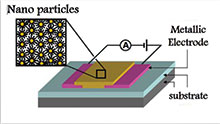Scientists at the Technion-Israel Institute of Technology, Haifa, have developed a flexible sensor that they say could be used as artificial electronic skin, or e-skin, and attached to prosthetic devices, allowing users to feel environmental changes and sense touch. While existing e-skin can detect touch, this new version is “at least ten times more sensitive…[and] can simultaneously sense touch, humidity, and temperature, as real skin can do,” said research team leader Hossam Haick, PhD.

Image courtesy of H. Haick, Technion-Israel Institute of Technology.
The sensor uses gold monolayer-capped nanoparticles (MCNPs) that are 5-8 nanometers in diameter. The gold nanoparticles are surrounded by connector molecules called ligands. “[MCNPs] can be thought of as flowers, where the center of the flower is the gold or metal nanoparticle and the petals are the monolayer of organic ligands that generally protect it,” said Haick. The sensor can run on low voltage, making it compatible with the batteries in today’s portable devices, and can be made quickly, easily, and inexpensively-additional measures that would allow it to make its way into mainstream society the researchers said.
The researchers laid the MCNPs on top of a flexible polyethylene terephthalate (PET) plastic substrate and the resulting compound conducted electricity differently depending on how the substrate was bent-when particles are brought together by the bending motion, it increased how quickly electrons passed between them-and the sensors showed repeatable responses even after a large number of bending cycles. The sensor’s electrical properties mean that it can detect a large range of pressures from tens of milligrams to tens of grams. The scientists also determined that the sensitivity of the sensor can be modified by varying the material and the thickness of the substrate.
The findings appear in the June issue of ACS Applied Materials & Interfaces.
Editor’s note: This story was adapted from materials provided by The American Technion Society.




